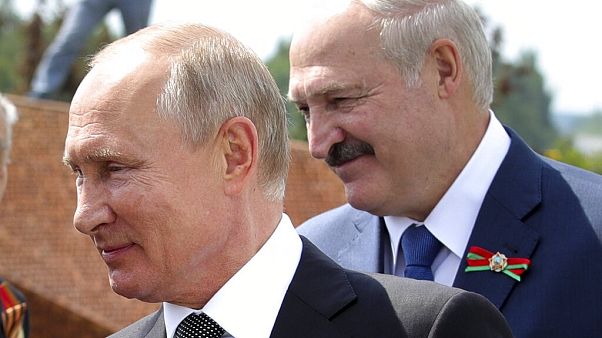Ties between Russia and Belarus cool ahead of presidential elections

The arrests marks a new low point in relations between the two countries. Belarus is tightly linked to Russia, and the two nations share an economic zone and are military allies but this cooperation has recently been under strain.
Historic ties
Nearly 30 years since splitting from the Soviet Union, unresolved questions about national identity underpin the upcoming presidential election.
The end of the Warsaw Pact alliance left Belarus squeezed between Russia to the East and the European Union to the West. How to manage this situation became a defining question, a problem that finds illustration in the different flags flown around Minsk.
The red and white flags of the opposition have anti-Moscow connotations: they refer to the pre-soviet era — when Belarus was briefly independent. The official flag is red and green, as it was during the time of the USSR.
First with Boris Yeltsin and then with Vladimir Putin, the early years of President Lukashenko's rule were marked by warm ties with Russia. Certainly, it was an alliance of necessity — Belarus depends on Moscow for fuel and trade, but it went further, with talk of a union between the two states.
Emerging disunion
The relationship between Minsk and Moscow has been cooling since last year, possibly because Lukashenko was worried that the union plan was beginning to look like a takeover.
He has recently sought to spread his options by strengthening ties with China and the United States.
A meeting with US Secretary of State Mike Pompeo last year was seen as a potential new opening for Belarus.
Still, Washington has since been highly critical of the arrest of political opponents during the current election campaign and the refusal of Minsk to allow international observers to monitor the poll.
Lukashenko's support base is in rural Belarus and his most recent speeches have sought to unite the country around overtly nationalistic rhetoric.
But it remains to be seen whether he will be able to contain the tensions that his authoritarian style of government generates, particularly among urban populations more attracted to economic liberalism.
He warned political opponents this week that authorities won't allow any unsanctioned demonstrations after the election.


Comments
Post a Comment